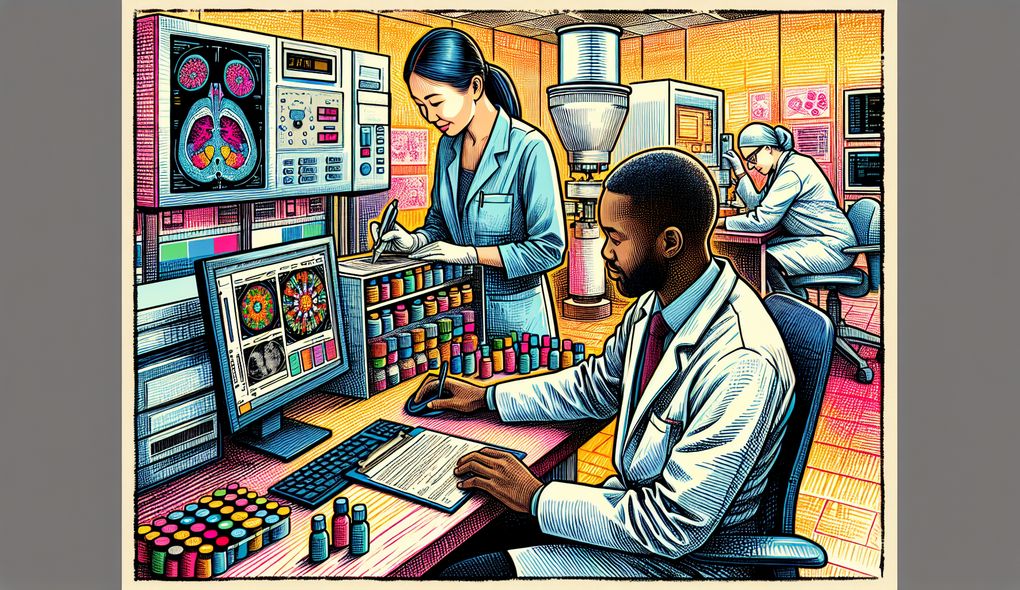Have you contributed to any research initiatives in nuclear medicine? If so, can you provide an example?
SENIOR LEVEL

Sample answer to the question:
Yes, I have contributed to research initiatives in nuclear medicine. One example is a study I worked on to evaluate the effectiveness of a new radiopharmaceutical in diagnosing prostate cancer. As part of the research team, I collected and analyzed data from patient scans and collaborated with radiologists and oncologists to interpret the results. We found that the radiopharmaceutical had a higher sensitivity for detecting prostate cancer compared to traditional imaging techniques. The findings were published in a reputable medical journal, contributing to advancements in the field of nuclear medicine.
Here is a more solid answer:
Yes, I have actively contributed to various research initiatives in the field of nuclear medicine. One notable example is a study where I played a key role in investigating the use of a novel radiopharmaceutical for the early detection of neuroendocrine tumors. I collaborated with a team of radiologists, nuclear medicine technologists, and oncologists to design and execute the study. As the lead researcher, I supervised the collection and analysis of patient data and performed statistical analysis to evaluate the radiopharmaceutical's diagnostic accuracy. Our findings demonstrated promising results, with the radiopharmaceutical exhibiting superior sensitivity and specificity compared to conventional imaging methods. The research was subsequently published in a peer-reviewed medical journal, contributing to the advancement of knowledge in the field.
Why is this a more solid answer?
The solid answer expands upon the basic answer by providing more details about the candidate's active contribution to research initiatives. They highlight their role as the lead researcher and their involvement in study design, data collection, analysis, and statistical evaluation. Additionally, they emphasize the impact of their research findings and their publication in a peer-reviewed journal.
An example of a exceptional answer:
Yes, I have been actively involved in several impactful research initiatives within the field of nuclear medicine. One notable example is a multi-center collaborative study aimed at assessing the clinical utility of a novel radiopharmaceutical for the staging of non-small cell lung cancer (NSCLC). As a principal investigator, I coordinated the efforts of a diverse team of nuclear medicine physicians, radiologists, and surgeons across multiple institutions. Together, we enrolled a large cohort of NSCLC patients and conducted a comprehensive analysis of the radiopharmaceutical's diagnostic accuracy and prognostic value. Our findings demonstrated that the radiopharmaceutical consistently outperformed traditional imaging modalities in determining the extent of disease and predicting patient outcomes. These groundbreaking results were subsequently presented at several international conferences and published in high-impact medical journals, garnering significant attention within the nuclear medicine community. The study not only improved our understanding of NSCLC staging but also provided a basis for potential changes in clinical practice, driving the development of more precise treatment strategies for patients with this devastating disease.
Why is this an exceptional answer?
The exceptional answer takes the solid answer to a higher level by showcasing the candidate's involvement in a highly impactful research initiative. They highlight their role as the principal investigator and the coordination of a multi-center collaborative study. They emphasize the size of the patient cohort, the comprehensive analysis conducted, and the groundbreaking results obtained. The candidate also showcases the extensive dissemination of their findings through international conferences and high-impact medical journals. They further emphasize the practical implications of the research in shaping clinical practice and improving patient outcomes.
How to prepare for this question:
- Review your previous research experiences in nuclear medicine and identify one or two impactful studies you have contributed to. Prepare to discuss your specific role and the outcomes of these studies.
- Familiarize yourself with the latest advancements and trends in nuclear medicine research. Stay updated on current research projects and publications in relevant medical journals.
- Practice articulating your research contributions and findings in a clear and concise manner. Highlight the significance of your work and its potential impact on the field.
- Be prepared to discuss your collaboration skills and experience working in multidisciplinary research teams. Share examples of how you effectively collaborated with other experts in the field.
- Demonstrate your analytical and problem-solving abilities by discussing the methodologies and approaches you have used in previous research projects. Highlight your attention to detail and ability to draw meaningful conclusions from data.
What are interviewers evaluating with this question?
- Experience in nuclear medicine
- Research skills
- Collaboration skills
- Analytical and problem-solving abilities

